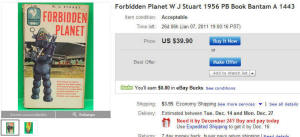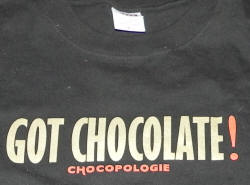Forbidden Planet — The Book
In the final decade of the 21st century... men and women in rocket ships landed on the moon. By 2200 A.D., they had reached the other planets of our solar system. Almost at once there followed the discovery of hyper-drive through which the speed of light was first attained and later greatly surpassed. And so at last, mankind began the conquest and colonization of deep space. United Planets cruiser C57D, now more than a year out from Earth base on a special mission to the planetary system of the great main sequence star, Altair.
The beginning narrative of the movie, above, which I remember well, led me to a huge and unsuspected universe of Forbidden Planet fans. None of which has anything to do with this blogitem, which, as clearly indicated in the title, is about the book. But the fact that at least one person seems to have made a serious effort to make the Forbidden Planet universe comport with that of Star Trek seems sufficiently remarkable to warrant this pre-digression.
Forbidden Planet is one of my favorite movies. I like it so much that I have purchased copies in VHS and DVD format and even own a lightly-used laser disk thereof. I probably watch it at least once a year, and actually sent a letter to a print magazine defending it against an off-hand comment about its grade-B-ness. Credentials thus established, you won't be shocked to discover, as I did recently, that I even have a copy of the book. I have no idea when or where I obtained the book. I happened to come across it on my shelves when I was considering making E-books to read on my iPad.
What iPad? E-books?
Q: After what you
wrote about
the iPad, you got one?
A: No, two.
Q: I thought you had to buy
E-books, not make them.
A: Maybe you do.
I own (well, license, I suppose) three different copies of Forbidden Planet, necessary because the players upon which the media depended grew obsolete. As I discussed in this modestly cranky blogitem, I have no desire to re-buy my books in electronic format. Prophetically, I wrote
"Digitizing books is a big nuisance, although making a book "ripper" wouldn't be much of a challenge if it were to be mass marketed. (And, if it were a ripper literally as well as colloquially, it would solve the problem of what to do with the remanent hardcopy that will otherwise distress the lawyers and booksellers.)"
Although nobody claims to be offering a mass-produced book "ripper," it turns out that I have one in my basement.
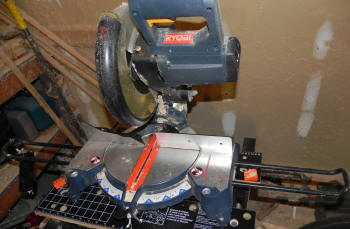 |
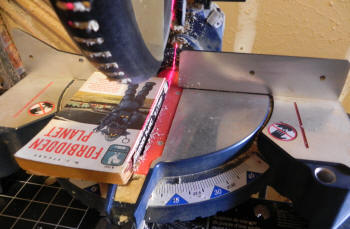 |
| Yes, it's a circular saw. | Against rotating blade and laser
action, an aging book doesn't stand a chance! |
My copy of Forbidden Planet is old. It seems to have been printed in 1956, and is in "acceptable" condition. "Acceptable" seems to be a bookseller's euphemism for "terrible." The pages are crumbling, the binding is loose, and the whole book would turn to dust with the slightest provocation. It also seems to be a bit of a collector's item, based on at least one eBay seller's attempt to get almost $40.00 for a $.35 paperback.
My copy is (was) somewhat better. Acceptable-plus, perhaps. But reading was "going to be tough." Just as some people like their beer "easy drinking" and I like my socks "easy wearing," I like my books "easy reading," at least in the physical sense. Even though I can cope with the occasional allusion and have no trouble with suspension of disbelief, I like my printing as crisp as Grace Slick likes her lettuce. After due consideration of the following:
-
I could try to read the book as-is, but that would damage it beyond salability or further perusal
-
I could sell it on eBay but I wouldn't be able to read it at all
-
I could damage it beyond salability without reading it by first scanning the pages and thus preserving it for multiple readings
I selected the third option and unlimbered the saw.
How To Make An E-book
Not exactly a Wikihow article, but I would be remiss if I didn't share this technique, since a crumbled book is nobody's friend. All you need is a circular saw (or band saw or jig saw), a sheet-fed scanner with software, and, of course a book.
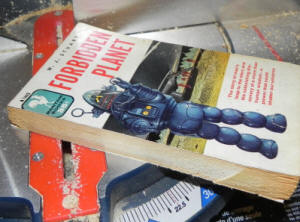 |
Place book under saw and remove the binding, being careful not to remove the printed portion or any of your own manipulative appendages. |
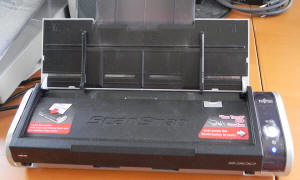 |
Set scanner to the correct mechanical size for the book, and the software scanning parameters for double-sided pages and no page number limit. Here I'm using a Fujitsu ScanSnap S300, which comes bundled with OCR (optical character recognition) software that will turn your scans into searchable PDFs. |
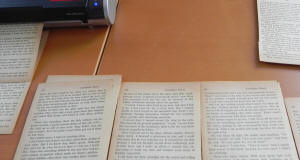 |
Carefully separate the book, page by page, into stacks of about 10 sheets each, or whatever quantity you find works best with your scanner. This assures that there is no residual glue between successive pages and prevents further damage if the feed mechanism were to grab more than one page. |
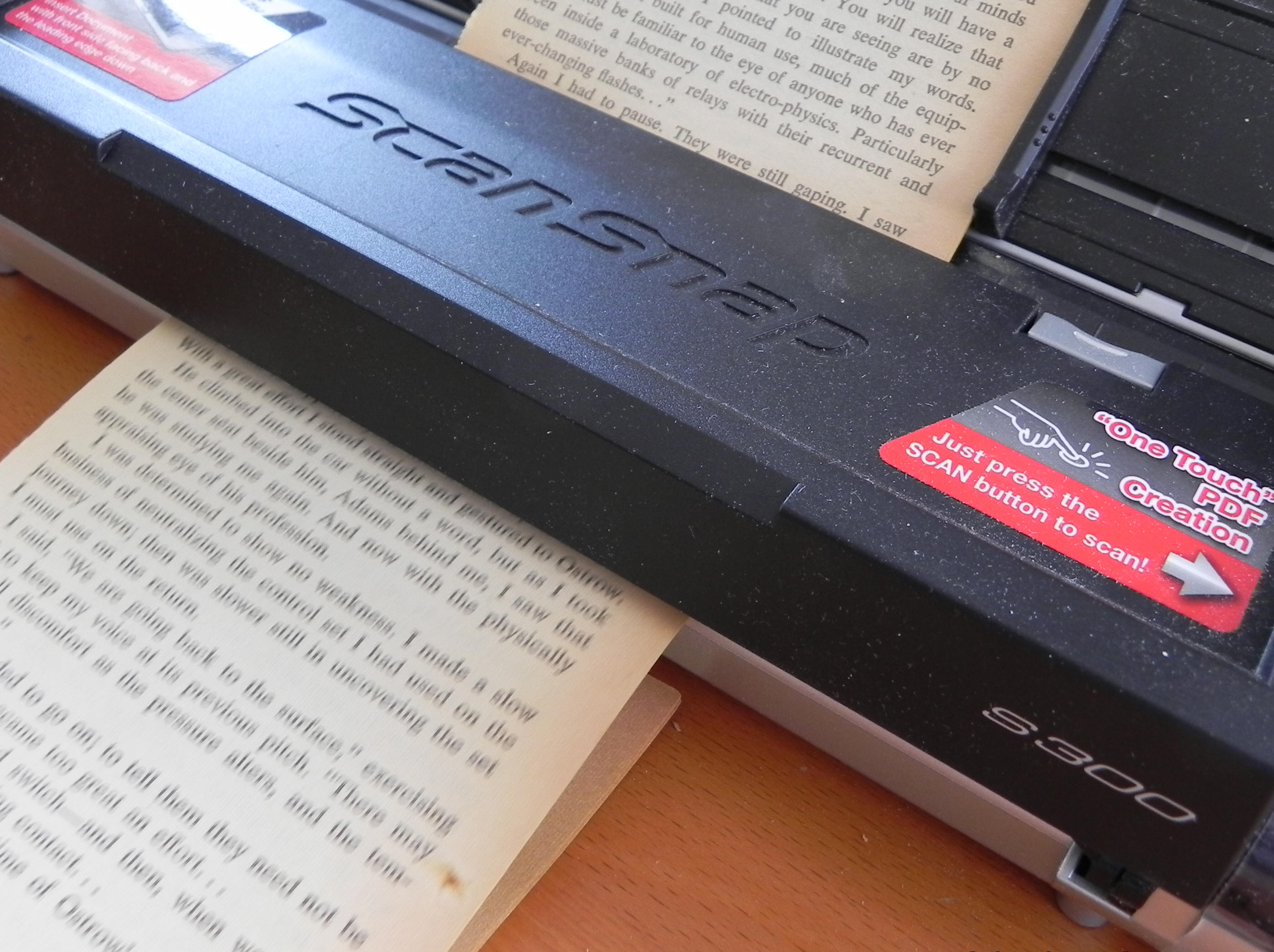 |
Scan, Baby, scan! The pages go through at the rate of about 10 sheets (20 pages) per minute. Monitor carefully, as a jam or double-feed may occur. Also, if the book is in especially bad condition, you may have to help the pages along. When the feeder is almost out of its stack of ten sheets, carefully insert the next ten so that the whole book can be read in as a single PDF. The Fujitsu scanner can handle the thicker covers as well as the individual pages, although it might help to feed the covers manually, or at least have them as part of a smaller stack of pages. |
In addition to rescuing Forbidden Planet, I have a number of other ancient books, most printed in the '50s, that have suffered and benefited from this treatment. It takes a bit of coordination (which is about as much as I have) to do this smoothly without getting the pages out of sequence or letting the scanner outrun you. I had a number of false starts in developing this process, such as trying to use a belt sander instead of a saw, and getting the software set up right.
Apple doesn't make it too convenient to get the PDFs into the iPad, a device which deserves and may get a RIKLreview in the future. But it can be done, and the iPad makes a good E-book reader. My ex-copy of Forbidden Planet now has a new home.
UPDATE: 24 June 2025(!)
Unsurprisingly, I have rendered more than this one book electronically readable on my iPad. Since the books were destroyed in the process, I had no concern that I was somehow violating the authors' rights by creating a second copy. However now, 15 years later, it's nice to have senior federal judge William Alsup confirm it. While his decision was in a different context involving AI training, it incorporated this statement:
"...The digitization of the books purchased in print form by Anthropic was also a fair use but not for the same reason as applies to the training copies. Instead, it was a fair use because all Anthropic did was replace the print copies it had purchased for its central library with more convenient space-saving and searchable digital copies for its central library—without adding new copies, creating new works, or redistributing existing copies."


